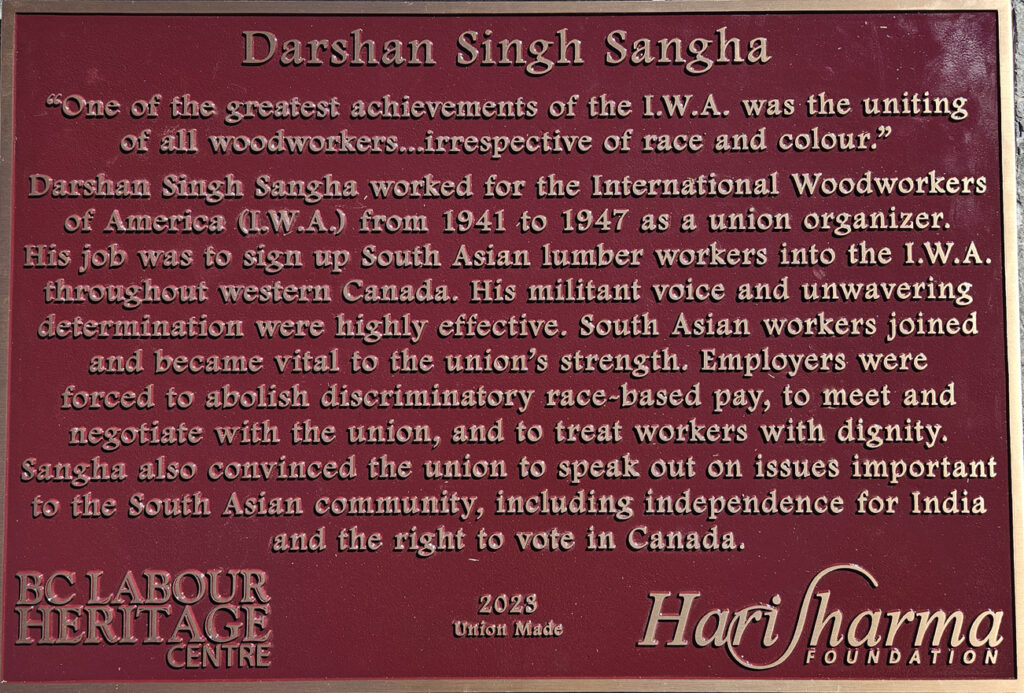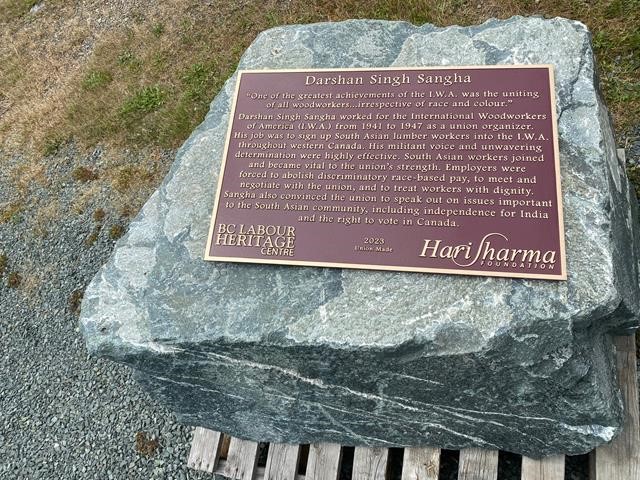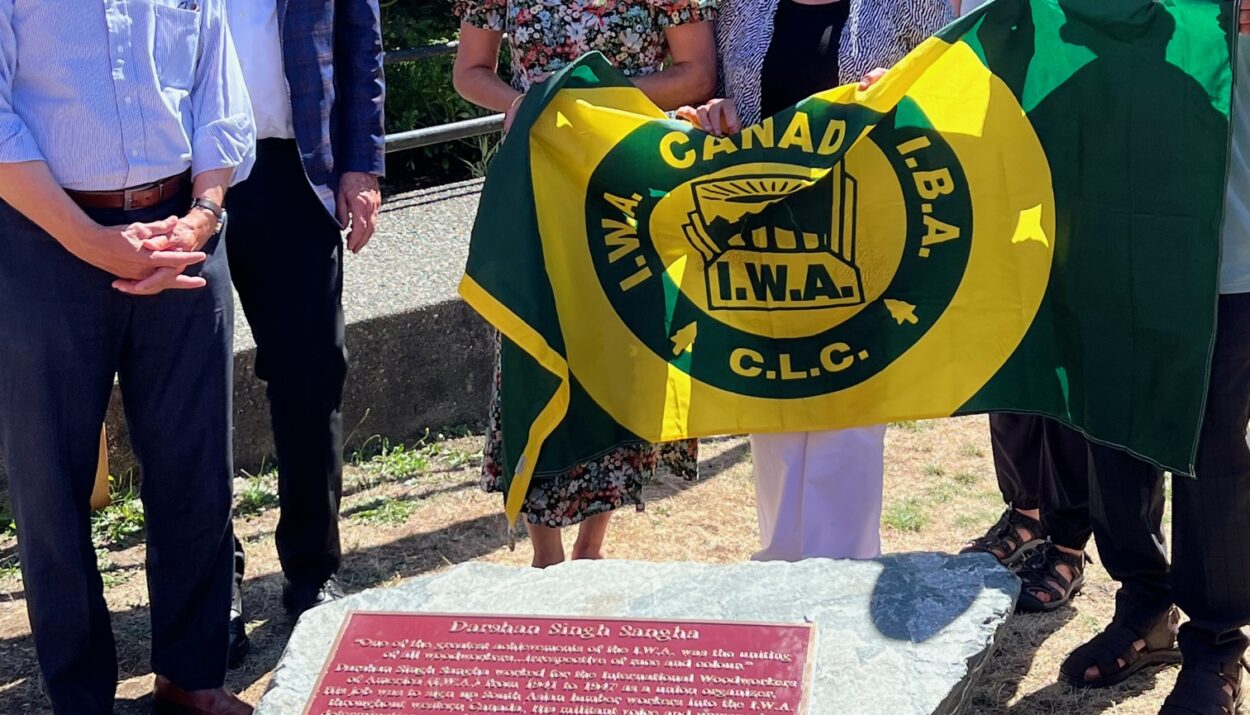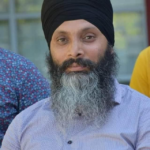By Harinder Mahil
Darshan Singh Sangha also known as Darshan Singh Canadian was honoured by the BC Labour Heritage Centre and Dr. Hari Sharma Foundation for his contribution to the trade union movement in British Columbia and South Asians winning the right to vote in a ceremony held on August 15, 2023. During the ceremony, a plaque was unveiled in his honour.
It was my privilege to participate in the ceremony attended by politicians, labour and community leaders and members of the Darshan Singh’s family at Kaatza Station Museum in Lake Cowichan. Premier David Ebby sent a message to those attending the ceremony to honour Darshan Singh Sangha.
Those who spoke during the ceremony included Raj Chouhan, Speaker of the Legislative Assembly; Bruce Ralston, BC Minister of Forests; Hermender Singh Kailley, Secretary-Treasurer of the BC Federation of Labour; representatives of the United Steelworkers and Donna Sacuta, Executive Director of the BC Labour Heritage Centre.
Darshan Singh came to Canada in 1937 at a young age of 19 and stayed here until 1947.
Sadhu Binning and Sukhwant Hundal have written an excellent piece on Darshan Singh’s time in British Columbia. Their research shows that he was an extremely effective speaker who persuaded South Asian workers to join the International Woodworkers of America (IWA).

He was one of the first labour leaders in British Columbia that publicly spoke against racism and discrimination. I believe that the IWA would not have been what it became if it was not for the efforts of Darshan Singh Canadian and his colleagues. His activism forever changed B.C.’s labour movement by showing that racial discrimination divides workers and serves the interests of employers.
During the time he was in Canada, Darshan Singh was involved in three major struggles:
1. The first one to unionize Indo Canadian workers in the IWA. This was a time when a union organizer could be arrested for his or her union activism. British Columbia’s history is full of examples where union leaders were arrested and harassed simply because they were trying to unionize workers.
2. Second, he was also involved in the struggle of the Indian community in B.C. to regain the right to vote. That right had been taken away in 1907 for discriminatory reasons.
3. Third, he was involved in India’s struggle to gain independence from the British.
When he came to Canada, he was a 19-year-old young man who came from a poor farming family as a student. He went back in 1947 and played an important role in the democratic process in India.
In 1930’s and 40’s, those who came from India were referred to as East Indians or Hindus. Their population in Canada was very small and most of them were either farmers or retired soldiers from Punjab. Due to racial discrimination, they could only find work either on the farms or in the lumber industry.

In the mills, there were different rates of pay depending on the colour of workers’ skin. South Asians and Chinese workers were paid less than their white counterparts. They were the last ones to be hired and first ones to be fired. They were not allowed to operate any machinery or hold any skilled jobs. Darshan Singh fought against this discrimination and was able to persuade the IWA to do so as well.
Darshan Singh’s work in the IWA was not just limited to organizing Indian workers. He was the recording secretary for the IWA’s Victoria local and an officer of the Victoria district labour council.

In 1946, Darshan Singh attended the Canadian Labour Congress (CLC) convention in Toronto as an IWA delegate. He put forward a resolution for the unity of the Trade Union Movement in Canada. The fact that Darshan Singh put forward this resolution shows that he also contributed to the labour movement at the federal level and that his contribution was not limited to BC.
The unveiling of the plaque honouring Darshan Singh Sangha recorded important histories of the IWA, British Columbia’s trade union movement and that of the Indo Canadian community.
The struggles for unionization and against racism that Darshan Singh was involved in continue to this date. We need more activists and leaders like Darshan Singh to make this world a better place for all of us.
Harinder Mahil is a human rights activist and is secretary of Dr. Hari Sharma Foundation.















8 Comments
Kuwin
3 months agokuwin sở hữu kho game đa dạng từ slot đến trò chơi bài đổi thưởng, mang đến cho bạn những giây phút giải trí tuyệt vời.
MM88
3 months agoKhám phá thế giới giải trí trực tuyến đỉnh cao tại MM88, nơi mang đến những trải nghiệm cá cược thể thao và casino sống động.
GO88
3 months agoTham gia cộng đồng game thủ tại Go88 để trải nghiệm các trò chơi bài, poker phổ biến nhất hiện nay.
Police Badge York-Police-Badge
3 months agoThanks for sharing your knowledge on this topic. It’s much appreciated.
Kuwin
3 months agokuwin sở hữu kho game đa dạng từ slot đến trò chơi bài đổi thưởng, mang đến cho bạn những giây phút giải trí tuyệt vời.
GO88
3 months agoTham gia cộng đồng game thủ tại Go88 để trải nghiệm các trò chơi bài, poker phổ biến nhất hiện nay.
MM88
3 months agoKhám phá thế giới giải trí trực tuyến đỉnh cao tại MM88, nơi mang đến những trải nghiệm cá cược thể thao và casino sống động.
online Gambling
2 months agoonline Gambling online Gambling